The
essence of the article is at the end.
"Beckwith
is knowledgeable on climate science and an experienced blogger with a
strong following. He obviously cares passionately about the planet
and is an earnest champion for confronting climate change. But in my
view, he will be most effective if his interpretation of science more
carefully stays within the confines of published results and their
nuances."
In other words, don’t scare the punters with talk of the climate emergency. Keep it within the the Consensus.
Man
behind claim that jet stream made
rare equator transit responds
to criticism
3
August, 2016
On June 30, I published the opinion piece “Claim that jet stream crossing equator is ‘climate emergency’ is utter nonsense.” It referred to a blog post written by Paul Beckwith, who I asserted had made this claim.
I reached out to Beckwith requesting comment both immediately before and after publishing my post. Due to miscommunication, I did not receive his response until July 20.
I am reposting portions of Beckwith’s response in segments below. They are edited for length and to focus on substantive disagreements. Beneath each of Beckwith’s responses, I reply.
You can read Beckwith’s response in its entirety on his blog: Paul’s Response to Washington Post, Jetstream Article.
Beckwith begins by expressing concerns over the title of my story:
[The] title is extremely misleading, and does not represent my position at all. I did not say that the action of the jet stream crossing the equator was in itself a “climate emergency,” as you state in the title.
What I did actually say is the following, which is in the actual description of my video:
“The jet stream in the Northern Hemisphere has crossed the equator and joined up with the jet stream in the Southern Hemisphere. This seems like new behavior, and indicates that climate system mayhem is ongoing. Our climate system behavior continues to surprise us in new and scary ways that we have never anticipated, or even seen before. Welcome to climate chaos. We must declare a global climate emergency …”
This statement is reiterated and elaborated upon throughout the video.
My response:
I do not feel the title of my piece was misleading. It connects a series of statements that were on Beckwith’s blog. He stated the jet stream had crossed the equator, that it seemed to be new behavior indicative of “climate system mayhem” and that “we must declare a global climate emergency.”
Further down in his response to my piece, Beckwith clarified that the jet stream behavior was just “another piece of the puzzle” for declaring a climate emergency which, he says, he has been recommending for years as alarming evidence for rapid climate change has piled up (which he describes). I appreciate this clarification, but it’s apparent that he considered the jet stream’s behavior as rationale (even if one among many) for calling a climate emergency, so I don’t think the title was a stretch.
Beckwith alleges that I misunderstood his use of the word “unprecedented” in describing the jet stream’s behavior:
In my original website post on Wednesday, June 29 at 1:46 a.m. EST, and in my YouTube video I used the title “Unprecedented, Jet Stream Crosses the Equator.” I quickly realized that one should really “Never say never” and “Never say always.” Thus, I corrected this erroneous title on my website post later that same day, on Wednesday, June 29 at 1:36 p.m.; and also shortly after that on my YouTube video to “Jet Stream Crosses the Equator, Unprecedented?”
When The Washington Post article came out the next day at 12:43 p.m. on Thursday, June 30, almost a full day after my title correction, it unfortunately remarked on my original title, and not on my corrected title. I intended to be asking a question, namely, was the movement of the jet stream perpendicular to the equator a new behavior? I was not intending on claiming that it was new, but was asking the question since it seemed to me to be very unusual.
My response:
The version of story I commented on stated that the jet stream behavior was “unprecedented,” period. There was no question mark. Several other stories that discussed Beckwith’s blog post also quoted him describing the jet stream behavior as unprecedented, with no qualification.
Beckwith also stated that the behavior was unprecedented on Twitter:
Unprecedented. Jet Stream Crosses Equator. Crazy Times.wp.me/p6LxRm-G9 #climate #weather #climatechange
When you make an extraordinary claim on widely read blog that then goes viral, you become responsible for what you originally post. If you have second thoughts and want to backtrack, that’s fine. But then you need to prominently correct your blog and contact all of the media outlets that originally quoted you to set the record straight. Simply slipping in a question mark to qualify your statement after the fact without very obviously calling attention to it is inadequate.
Beckwith says that image I chose to feature in the article as an example of cross-equatorial flow (which I stated was common) did not adequately display the unusual behavior he was referring to in his blog and video:
The image chosen for the article shows some weak cross-equatorial flow, and does not even show the image that I used in the video showing flow normal to the equator, connecting the two hemisphere jet streams. This image in the article is thus very misleading, and poorly chosen for the article.
Figure 1 [below] shows an image of the jet streams crossing the equator from my original viral video. On the left we see flow crossing perpendicular to the equator, while on the right we see flow crossing the equator at a shallow angle, more indicative of monsoonal flow. This distinction was completely ignored in the Washington Post article.
Figure 1: Image of jet streams crossing equator in my original viral video. Data is from June 28, 2016, at 20:00 local time. The Washington Post article did not post this, but posted an image of a basic monsoonal flow.
[In his response, Beckwith provides additional “better images of jet streams crossing the equator" from Feb. 4 to 6, 2014, which I have compiled into an animation provided below.]
My response:
If the image I selected for my original piece doesn’t adequately exhibit the unusual jet stream behavior Beckwith wished to call attention to, I’m happy to concede that. But it doesn’t change my main argument.
There’s a tremendous burden of proof to claim the jet stream’s behavior is profoundly changing. You can’t just cherry pick several examples and jump to the conclusion that “climate system mayhem is ongoing.”
You need to do rigorous statistical analysis of decades’ worth of data, prepare a written analysis and submit to the peer-reviewed publications for evaluation. Beckwith has not done this, to my knowledge.
There is a vigorous debate going on within the academic community about whether climate change is altering the jet stream. Scientists on both sides of the debate have performed painstaking analyses that have needed to withstand the rigor of peer review.
A study published in the Journal of Climate this summer argues the opposite, concluding: “This study adds [to] the growing body of work suggesting that warming in the lower troposphere associated with Arctic amplification is not currently a direct driver of anomalous midlatitude circulation changes.”
I should add no peer-reviewed study discusses the jet stream crossing the equator or cross-equatorial flow as a consequence of climate change. If Beckwith believes this to be the case, he should construct a hypothesis, conduct an analysis and get it published.
Beckwith states I did not adequately describe his credentials:
In this article I was referred to twice as a “blogger,” and also as a “non-expert,” a “non-specialist” and as “working on a PhD with “a focus on abrupt climate system change” at the University of Ottawa.” I am glad that the latter is mentioned, although I wish to add the title of part-time professor in the Department of Geography at the University of Ottawa.
My response:
We typically must be concise in describing people’s affiliations and background in our publications, which is why I did not provide more information about Beckwith’s credentials.
Link: About Paul Beckwith
He objects to being referred to as a non-expert and non-specialist, noting that he has taught six university-level courses in related fields (e.g. meteorology, climatology, etc.). But I would simply say he has not published studies in the peer-reviewed literature pertaining to atmospheric circulation, which is the pertinent issue. Without having been a participant in the academic process, Beckwith has not positioned himself to be an expert source of information in this complex and controversial area.
Beckwith takes issue with the selection of experts I quoted in the story who said the jet stream behavior was not unusual:
Regarding the “atmospheric scientists” who are “trusted sources in the profession”; first of all they were asked to comment on the “Unprecedented” misquote rather than the “Unprecedented?”; the question mark I used is clearly essential to describe my position. The first two people quoted are not climate scientists who see the big-picture. … They are specialists in meteorology, a field in which over half of the specialists have been very strong climate deniers until recently.
My response:
The material I commented on and presented to experts for reaction stated the jet stream behavior was unprecedented. I cannot be held accountable for how Beckwith decided to qualify his key assertion after the fact.
I selected a diverse group of experts, several of whom have published papers on the general circulation of atmosphere, to comment on Beckwith’s initial claim. I reject the idea that you must conduct a litmus test on an expert’s views about climate change to quote them in a story about jet stream behavior. What is far more important is whether they understand atmospheric dynamics, and all of the individuals I quoted have demonstrated such knowledge, in my view.
In any event, none of the individuals I quoted deny human-induced climate change is occurring though they hold a variety of perspectives as to how significant a problem it is. But, even with their diverse views as to the seriousness of climate change, they unanimously agreed the jet stream behavior was not unprecedented or even unusual.
A number of leading climate scientists, who are vocal advocates for action on climate change, agreed with the arguments presented in my piece and stated such on Twitter:
I side w/ @CapitalWeather on this one. The sensationalist claim that jet stream is crossing equator is just wrong:washingtonpost.com/news/capital-w…
Another internet myth debunked: Claim that jet stream crossing equator is 'climate emergency' is utter nonsense wpo.st/ymmj1
The website Climate Feedback, in which leading climate scientists review the credibility of articles published in the media, examined a story in the Independent trumpeting Beckwith’s “unprecedented” claim. It gave the story a “low” credibility score and concluded: “In reality, such wind features are frequently observed and the central claim of the article is thus unsupported by science.”
Beckwith comments on my conclusion that extraordinary scientific claims require vetting and peer review:
The last paragraph of the article states “Examples like this demonstrate the pitfalls of extraordinary claims posted on blogs and the importance of consuming science that has been vetted and peer-reviewed.”
Of course vetted and peer-reviewed science is vital for advancing knowledge. Of equal importance — and I would argue is almost completely ignored — is the vital ability of people like myself to read and understand the peer-reviewed science from specialists and put together a coherent picture of how all the parts come together, and what that will mean for our near term and longer term future on Earth.
Clearly, almost no one in our society is connecting the dots on all the pieces, who has a loud enough voice and impact in educating the public, policy makers and global leaders on what it all means, in terms of the absolutely enormous risks to society.
My response:
I’m glad Beckwith appreciates the importance of peer-reviewed science. But until he stepped back from his claim that the jet stream was behaving in “unprecedented” ways, he was overreaching.
As I commented earlier, the hypothesis that global warming is changing the jet stream in detectable ways is controversial, and the jet stream crossing the equator isn’t even behavior that has been explicitly assessed in the literature. So when Beckwith speaks of the “vital” role of bloggers in interpreting the peer-reviewed literature and “connecting the dots” between the science, society and the environment, he is going beyond accepted state of knowledge when he refers to the jet stream’s “new behavior” and “climate system mayhem.”
Beckwith is knowledgeable on climate science and an experienced blogger with a strong following. He obviously cares passionately about the planet and is an earnest champion for confronting climate change. But in my view, he will be most effective if his interpretation of science more carefully stays within the confines of published results and their nuances
Paul Beckwith published an article on WordPress
.
Accolades to my new friend Jason Samenow, The Weather Editor of the Washington Post, Capital Weather Gang, for his good will publishing most of my response. Here is the much awaited publication of my response and reply by The Washington Post: 'Man behind claim that jet stream made rare equator transit responds to criticism'. What was unpublished is also interesting. My full response is here: 'Paul’s Response to Washington Post, Jetstream Article'.



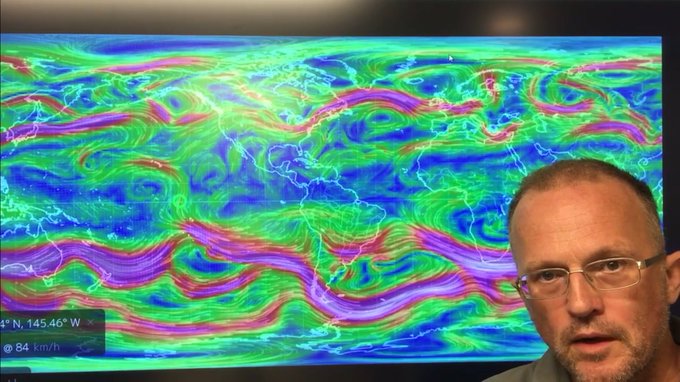
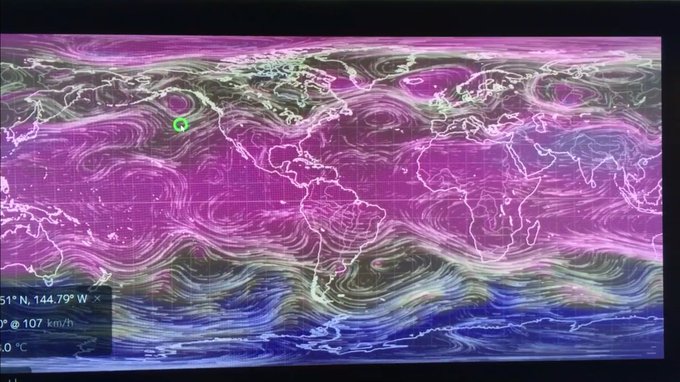
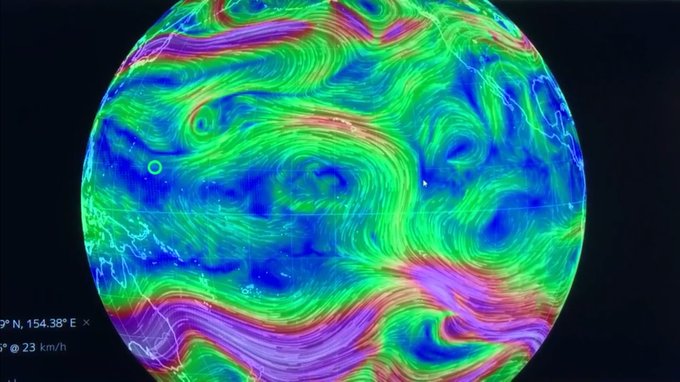
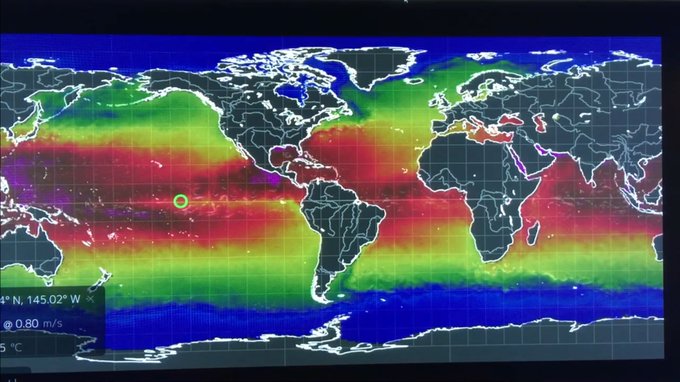


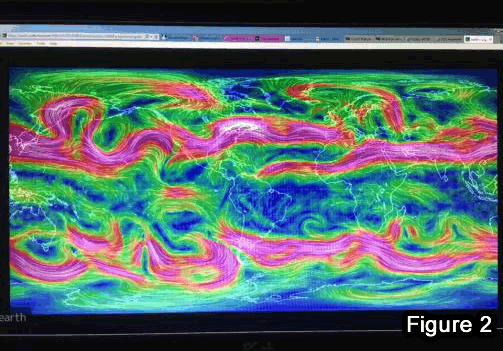




No comments:
Post a Comment
Note: only a member of this blog may post a comment.